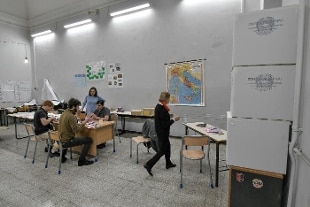repertoire image
Elections and referendums: tomorrow and Monday to vote with the anti Covid measures
Share
19 September 2020Orphaned urn of the tellers, fleeing the risk of Covid.
The fear of contagion mounts in the polling stations that will host the next elections on 20 and 21 September, the first votes since the beginning of the coronavirus emergency.
Various territories from north to south are sounding the alarm about the renunciations reached by municipalities and prefectures, where there are 'justifications' and medical certificates.
In Puglia, where both the regional and the municipal ones will be held in different territories, over 200 Civil Protection volunteers are ready to replace the deserters among the presidents and the members of the polling stations appointed by the Court of Appeal for the elections on Sunday and Monday.
In all provinces of the region there were high rates of renunciation.
In Bari we reach 67%, only considering the polling presidents (228 people), and among these all those nominated for Covid seats, i.e. those set up in hospitals or for the sick in isolation, have renounced.
The record number of renunciations is officially due to 'unavailability', but it is clear that for most the fear of contagion affects, given the clear exceeding of the physiological average of renunciations, which in the last regional elections was 40%.
At the moment 203 presidents have been replaced with reserves.
In Imperia 114 defections out of 180 tellers
Among the cities where the highest number of defections is reported there is also the Ligurian one of Imperia, where 114 out of 180 tellers that the Municipality is replacing due to the renunciations arrived at the electoral office .
Most of these have already been replaced.
But the governor Toti assures: "The vote for the regional elections in Liguria and the referendum will be absolutely safe because the seats in themselves are places of social distance: the secrecy of the vote, the entry one by one into the voting booths , sanitization is an absolute guarantee of safety ".
On the other hand, eighty in the city of Naples (out of 885 appointed by the Court of Appeal) are the presidents who have already given up their position in view of the vote on Sunday and Monday, just under 10%.
In the Campania capital and throughout the Campania region, where infections are growing sharply, it is feared that voters will desert the polls for fears of the virus.
"From the citizens in these hours I have collected a lot of fear and concern, especially from the elderly, regarding the risk that the seats could become a hotbed", explains Stefano Caldoro, candidate for the center-right for the presidency of the Region.
Risk of non-voting by the most fragile voters
The first elections in the Covid era risk being also the first in which the most vulnerable people are likely to desert the polls.
A risk, and a vulnus for democracy, against which the decree that the government approved in August, defining the rules for the electoral round, including the establishment of seats in the Covid departments of hospitals and the possibility of voting at home: in fact, less than a thousand applications arrived to exercise the right to vote from home.
But the patients in home isolation are currently 39,862, not counting all those who are in quarantine because of close positive contacts.
Beyond the fears, all the measures with the relative precautions on health safety have been arranged for some time in the structures that will generally host the vote - from schools to gyms to theaters.
The protocol provides for contingent access to the polling station buildings, distinct entry and exit routes, distancing between the components of the polling station and between them and the voters, definition of the number and arrangement of the polling booths taking into account the available space and the need for movement .
To access the polling stations, the use of a mask by anyone will be mandatory.
The extent of the distance between the components of the polling station and between them and the voters will be particularly rigid when the mask must be removed for recognition.
For this reason, the number and layout of the voting booths was also defined, taking into account the space available and the needs for movement.

